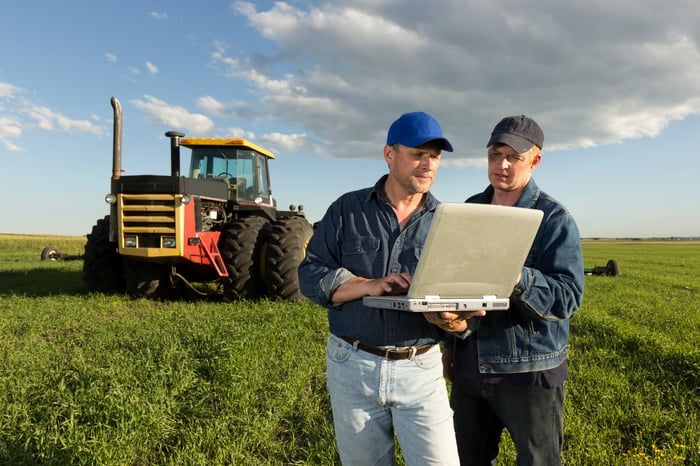With all the technological advancements we've seen, highlighted by Apple's iPhone, some families might find it difficult to get the whole group together at the dinner table at the same time. But once they do, they may be sharing food that was harvested with large machinery controlled by an iPhone.
Deere & Company (DE 0.97%) is heading in that direction, and that's not the only technological advancement it's planning for its fleet. Let's look at what Deere has been cooking up, and what that means for investors.

Image source: Getty Images.
Year-over-year sales growth
As the second-largest heavy equipment manufacturer in the U.S., behind only Caterpillar, Deere provides agricultural machinery used by farmers, construction companies, and residential consumers. In November, its earnings report crushed expectations in terms of sales and net income for the fourth quarter and full year. Thanks to strong demand in farming and infrastructure and a booming housing market, global revenue increased 16% year over year for the quarter and rose by 24% -- to $44 billion -- for the full year, resulting in the company's highest net income ever, and making it a very appealing agriculture stock to own for long-term investors.
Against the headwinds of supply chain issues and inflation, Deere offset the rising cost of materials and inflationary pressures by passing higher costs on to customers through 7% to 8% price hikes compared to the year earlier. That trend is expected to continue into 2022 as the strong demand that drove 2021 revenue is expected to last throughout this year.
The company also withstood a workers strike in November, reaching an agreement that will cost the company an estimated $3.5 billion over the next six years. But Deere's order books for 2022 are nearly full due to demand for crop care, combine equipment, and large tractors, so the company has kept a good outlook for fiscal 2022, stating that it doesn't believe supply chain disruptions and the higher labor costs will have an impact on profits. The company anticipates full-year net income of $6.5 billion to $7 billion, continuing on its record setting pace.
A driverless tractor could extend a growth streak
Helping support Deere's strong income is growing demand for its Precision Ag automation software package used by farmers for planning, navigation, documentation, analysis, and monitoring to optimize operations. Just like we're seeing artificial intelligence (AI) and automation play its role in other markets such as healthcare, gaming and entertainment, and the residential automotive market, AI plays a huge role in industrial equipment control and monitoring, making Deere's stock an underrated AI pick. Deere is anticipating 20% to 25% growth in sales for Precision Ag in fiscal 2022. And if market projections are accurate, the company could benefit for at least another six years, during which the precision farming software market is expected to grow at a compound annual growth rate of 13%.
But technology advancements don't stop there for Deere. In January it unveiled a new autonomous tractor that is ready for large-scale production aimed at saving farmers time, and relieving the stress of a tight labor market. The tractor is armed with 360-degree obstacle detection while navigating with accuracy, and can be easily controlled and monitored through an app installed on a mobile device with live video, images, data, and metrics. The tractor should be available to customers this year, and it may not be the only one featuring advanced technology.
Collaborating on the future
Deere's 2022 Startup Collaborator Program includes seven start-up companies working with Deere to develop solutions to advance automated farming capabilities. The companies in the program include Burro and Four Growers, which specialize in robotic platforms that lay the foundation for automation of harvesting and labor-intensive on-farm tasks, as well as SeeDevice and View AR, which specialize in image sensing, and augmented reality systems, respectively.
The benefit to Deere by having these companies in the program is twofold. First, it allows Deere to have firsthand knowledge and access to technologies helping shape the future landscape of farming. Second, it provides Deere with a nurtured relationship with companies that may develop the next revolutionary device or solution, giving Deere a potential first opportunity for partnering or acquisition. Both of these benefits could provide an advantage to Deere over its competition from a technological perspective, and in generating future revenue for the company.
Are fields of gold on the horizon?
After languishing in a price range between $108 and $138 for three years, Deere's stock price has been on a tear for the past two years, hitting $400 this month after a 184% gain since March 2020. The development of an automated tractor ready for production this year has led Baird analyst Mig Dobre to refer to Deere as "the Tesla of farming," noting that upgrade cycles will eventually apply, and that the company will likely spread the technology across other vehicles within its fleet. And we all know what's happened with Tesla stock over the past two years -- it's up 770%. Dobre has a 12-month price target of $475 for Deere stock.
So, is it too late to invest in Deere? I look at it this way: Deere is hitting on all cylinders. Demand and pricing are supporting current growth, while technological advancements and projected market growth should support new revenue. And if a revolutionary development were to come out of the collaboration program it could be game-changing. Plus, Deere's stock price carries a 20.6 P/E ratio, in a U.S. machinery industry with a P/E of 27, and a three-year average of 24. I'd say these are all good reasons to believe Deere will continue to grow, and the stock has more room to run for long-term investors.





